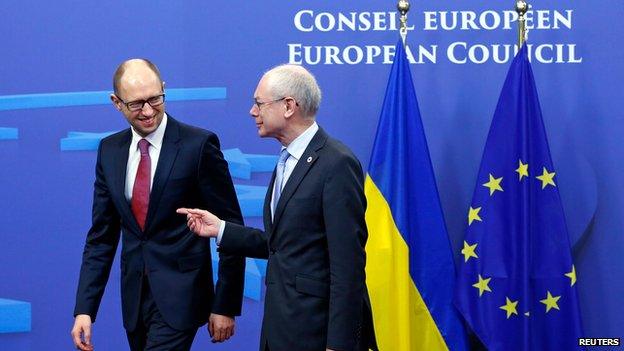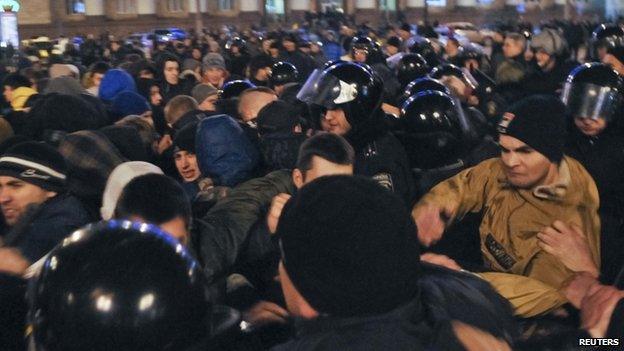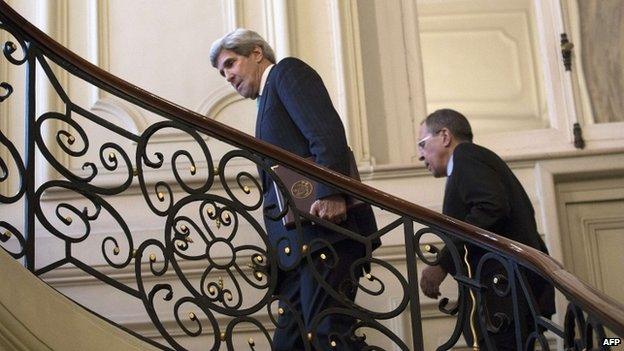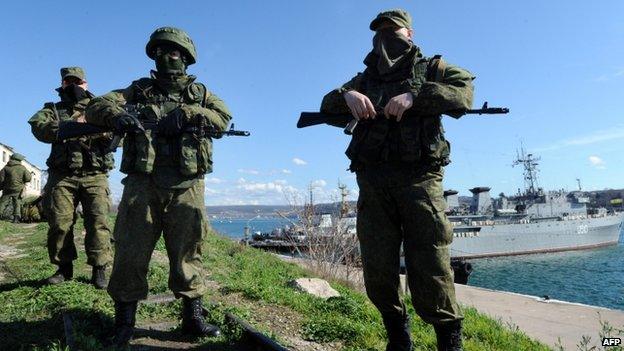Ukraine crisis: EU leaders to hold emergency talks
- Published

Ukraine's new interim prime minister, Arseniy Yatsenyuk, whose leadership is not recognised by Moscow, is welcomed by the EU's Herman Van Rompuy
EU leaders are to begin an emergency summit to decide how strongly they should respond to Russia's troop deployment in Ukraine's Crimea region.
Some members, particularly from Eastern Europe, want tough sanctions, while others, led by Germany, seek mediation.
Ahead of the talks, the EU said it had frozen the assets of 18 former Ukrainian officials, including ousted President Viktor Yanukovych.
Pro-Russian forces remain in de facto control of Crimea.
A tense stand-off continued overnight across the southern region, where Ukrainian troops remain blockaded in their bases.
In other developments:
Crimea will hold a referendum on 16 March, asking the peninsula's citizens whether they want to remain part of Ukraine or join the Russian Federation, local officials are quoted as saying
US-based Russia Today presenter Liz Wahl resigned on air in protest at Moscow's involvement in Ukraine, two days after another RT presenter criticised Russia on her programme
The Ukrainian flag is again flying over the regional government in the eastern city of Donetsk after the removal of pro-Russia demonstrators from the building
Russian Prime Minister Dmitry Medvedev announces plans to simplify procedures for Russian-speakers in foreign countries to gain Russian citizenship
'Symbolic sanctions'
Ukraine's interim Prime Minister Arseniy Yatsenyuk met the 28 EU leaders before their emergency meeting, which begins at 10:30 GMT.
He told reporters that Kiev was seeking a political solution, so "it depends on Russia, whether Russia is ready to fix this conflict or Russia is as always reluctant and will try to increase the tension".

A number of people were injured as participants of rival rallies clashed in Donetsk, eastern Ukraine

John Kerry described his talks with Sergei Lavrov as "tough"

Russian troops and pro-Russian militia continue to blockade Ukrainian troops and ships across Crimea
British Prime Minister David Cameron is hoping that, in alliance with Sweden, Poland and other Eastern European countries, he can persuade their colleagues of the need for Russian President Vladimir Putin to pay a price for the occupation of Crimea, the BBC's political editor Nick Robinson reports.
They will push not just for the suspension of EU-wide agreements with Russia on visa free travel and energy, but also the explicit threat - though not the implementation - of targeted sanctions, he adds.
However, other countries - led by German Chancellor Angela Merkel - are believed to be pushing for mediation as the best way out of the escalating crisis.
Ms Merkel is said to be worried that tough steps may undermine attempts to start a dialogue between Russia and Ukraine and distract from the need to support the new government in Kiev both economically and politically, our editor says.
The EU summit will probably impose some fairly symbolic sanctions, like halting talks on visa or trade liberalisation, the BBC's Chris Morris in Brussels reports.
But more substantive measures - including travel bans or asset freezes against senior Russian officials - are unlikely, our correspondent says. The idea is to offer strong support to Ukraine and simply try to keep talking to Russia.
However the assets of the former Ukrainian President Viktor Yanukovych along with his son and some of his closest allies have been frozen by the EU.
They are suspected of involvement in the violence against protesters last month as well as embezzling state funds.
US warning
On Wednesday US Secretary of State John Kerry discussed Ukraine with his Russian counterpart Sergei Lavrov in Paris.
Mr Kerry described the meeting as "tough", but said he was committed to working with Moscow to ease the crisis.
However, he stressed afterwards that that Russia's violation of Ukrainian sovereignty "would not go unanswered".
Both Mr Kerry and Mr Lavrov will meet again in Rome on Thursday for a long-planned conference on Libya, but it is not clear if they will carry on their discussions about Ukraine.
In Paris Mr Lavrov refused to meet his Ukrainian counterpart Andriy Deshchytsia, whose government Moscow does not recognise.
Mr Deshchytsia and Mr Yatsenyuk are part of the new regime in Kiev, which came to power after pro-Russian President Viktor Yanukovych fled to Russia.
Moscow regards the new government as illegitimate, and says that Mr Yanukovych is still the rightful leader.
